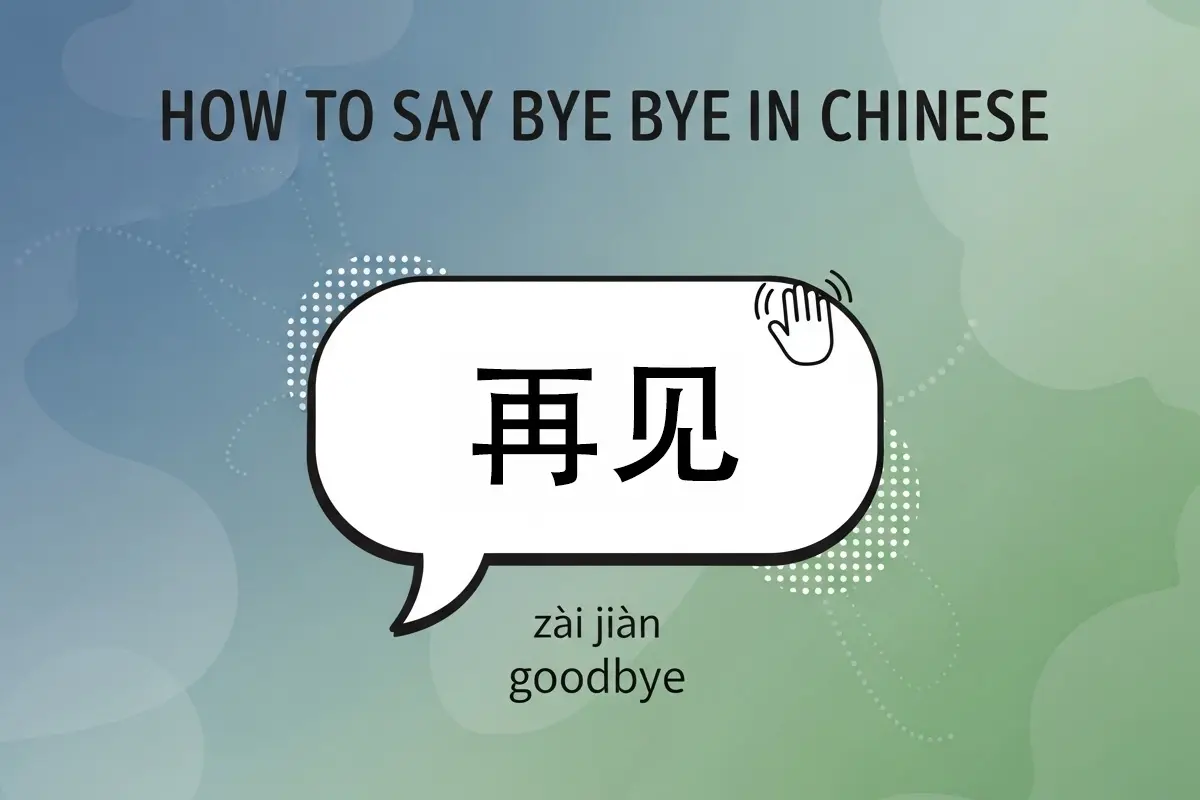
TL;DR
- The standard way to say bye bye in Chinese is 再见 (zàijiàn).
- The casual version is 拜拜 (báibái) — similar to “bye-bye” in English.
- Chinese goodbyes change based on politeness, closeness, and situation.
- Tone matters — zài (4th tone) + jiàn (4th tone) = “see you again.”
- Use playful forms like 回头见 (huítóu jiàn) with friends only.
How Do You Say “Bye Bye” in Chinese?
The most common way to say bye bye in Mandarin is:
再见 (zàijiàn) — “See you again”
- 再 (zài) = again
- 见 (jiàn) = to see
It’s polite, universal, and used in both casual and formal settings.
Another extremely common and friendly version is:
拜拜 (báibái) — “Bye-bye”
Borrowed from English, easy to say, and popular among young people.
5 Useful Ways to Say Bye in Mandarin
| Chinese | Pinyin | English | When To Use |
|---|---|---|---|
| 再见 | zàijiàn | Goodbye | Neutral, universal |
| 拜拜 | báibái | Bye-bye | Casual, friends |
| 回头见 | huítóu jiàn | See you later | Friendly tone |
| 下次见 | xiàcì jiàn | See you next time | Parting politely |
| 晚安 | wǎn’ān | Good night | Evening goodbyes |
Example:
A: 我先走了。
(Wǒ xiān zǒu le.) — I’ll leave first.
B: 再见!
(Zàijiàn!) — Bye!
Polite Ways to Say Goodbye in Chinese
When leaving a workplace, classroom, or speaking to someone older:
| Phrase | Pinyin | Meaning |
|---|---|---|
| 我先告辞了 | wǒ xiān gàocí le | I’ll excuse myself now |
| 保重 | bǎozhòng | Take care |
| 慢走 | mànzǒu | Walk safely (said to someone leaving) |
Chinese culture values respect — soft, humble language keeps harmony.
Casual and Cute Ways to Say Bye
Modern Chinese speakers love playful phrases:
| Chinese | Pinyin | Meaning |
|---|---|---|
| 拜啦 | bài la | Byeee! |
| 886 | bā bā liù | Internet slang: sounds like “bye-bye” |
| 再会 | zàihuì | Until we meet again (dramatic or poetic) |
You may hear these a lot online and in chat.
Common Goodbye Mistakes to Avoid
1️⃣ Saying 再会 in everyday conversation (sounds overly dramatic)
2️⃣ Using 拜拜 in professional settings (too casual)
3️⃣ Ignoring tones — bái bái ≠ báibái
💡 Tone difference can change the meaning completely — always mimic native rhythm.
Goodbye Expressions by Situation
| Situation | Best Option |
|---|---|
| At work or school | 再见 |
| Saying good night | 晚安 |
| Leaving a party with friends | 拜拜 |
| Ending a date politely | 下次见 |
| After a call or online chat | 下次聊 (talk again next time) |
Choosing the right goodbye keeps the conversation natural.
Mini Pronunciation Guide: 再见 (zàijiàn)
- Both characters use 4th tone — falling tone
- Strong, confident delivery: ZÀI-JIÀN!
- Literally means “see (you) again” — always positive
Want more pronunciation help?
Check out the tone guide in How Are You in Mandarin or practice phrases in How to Learn Chinese Fast.
Quick Goodbye Dialogues to Practice
| Mandarin | Pinyin | English |
|---|---|---|
| 我要回家了。晚安! | Wǒ yào huíjiā le. Wǎn’ān! | I’m heading home. Good night! |
| 拜拜,明天见! | Báibái, míngtiān jiàn! | Bye! See you tomorrow! |
| 我先走了,回头见! | Wǒ xiān zǒu le, huítóu jiàn! | I’ll leave first, see you later! |
Try saying them out loud — goodbye is a great first confidence builder.
FAQs About Saying Bye Bye in Chinese
Q: Can I use 拜拜 with older people?
A: Yes, but softer tone is best — it’s friendly but casual.
Q: Does 再见 sound formal?
A: It’s perfectly neutral — safe in any situation.
Q: How do you say “talk later” in Mandarin?
A: 下次聊 (xiàcì liáo) — casual and friendly.
Q: Is 886 real Chinese?
A: Internet slang only — sounds like bàibài liù (“bye-bye”) when said aloud.
Final Thought
Learning how to say bye bye in Chinese is more than vocabulary — it’s cultural connection.
Choose 再见 when in doubt, and 拜拜 for fun moments.
Mastering small phrases like this builds confidence for your Mandarin journey — one goodbye at a time.